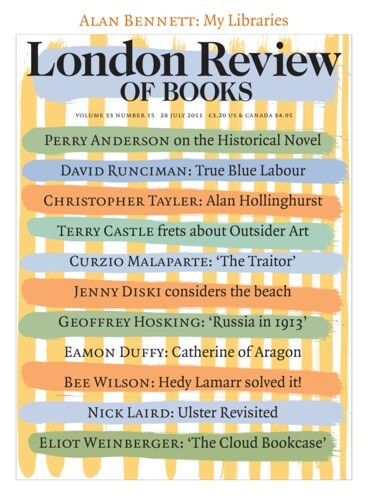Has the old cane-toad lost his touch? The BSkyB takeover bid nixed. Murdoch père and fils summonsed to Parliament with the ousted Rebekah Brooks. News Corp shares in free-fall. One would need a heart of stone not to gloat. Murdoch’s initial response to the crisis in closing the News of the World was acclaimed by several commentators as ‘brilliant’ but ‘ruthless’. That verdict seems at most half-correct. In fact, by folding NotW so early in the game, when (as some News Corp high-ups must have known) the anti-hackers had further high-value cards to play, NewsCorp blew its trump card and kept nothing in reserve. It would probably have done better to launch a wide-ranging internal inquiry, extract Brooks’s resignation there and then, and pledge full co-operation with any police investigation – closure could have been held back as a final pseudo-nuclear option.
Not that the garotting of the NotW should jerk many tears. Some have said that its torrent of celebrity drivel, xenophobia, materialism, kitsch jingoism, shag-’n’-brag and bullying of the vulnerable should be written down as a cost of free speech. Maybe this stuff is to the red meat of political debate what cowpats are to filet mignon. Not a few op-ed commentators still argue this, holding out against the dread prospect of statutory regulation. However, several bits of self-serving chaff get thrown into the picture here. One is the idea that journalists, as self-styled talkers of truth to power, should be above the law – the law against bribing the police, for example, or breaching privacy. Another, barely less absurd, has it that journalists’ doings can be laundered internally via the Press Complaints Commission. This watchdog is stuffed. It was barely noticed earlier this year when Northern & Shell, owned by the porn king Richard Desmond, pulled its funding from the PCC. As a result, the commission can’t deal with complaints against N&S titles, including the Express, Star and OK! magazine.
Not that external regulation has worked either. Recent disclosures, including John Yates’s frank admission that his failure to reopen the hacking investigation in 2009 was ‘pretty crap’, suggest that police action against reporters’ malfeasance is as hopeless as the PCC’s. As Stewart Tendler, a Times crime reporter, put it, apparently without irony, the relation ‘between police officers and crime reporters is very similar to that between police and an informant’. Indeed; except the cops were now playing informant and the hacks acting like the law. Powerful interests – hard cash for police officers, and the byline-or-perish ethos of the NotW newsroom – drove each to turn a blind eye to the other’s criminality.
This exposes for what it is the final, major bit of chaff – the notion that stopping the press from running wild by putting it under outside regulation menaces free speech. Two contradictory claims surface at this point. First, that a gentleman’s agreement ‘works’ better than the brute force of the law; and second, that the press is already subject to laws against breaches of privacy and corruption. As we’ve seen, enforcing the law in this area is not something to be entrusted to the police. Press barons themselves have not scrupled to use the law to gag speech, as with the indefatigably litigious Robert Maxwell and James Goldsmith.
The real argument about free speech lies elsewhere. It’s not just whether you get a platform, but how big yours is compared with other people’s. Free speech means little, though not nothing, if the opportunities for influencing opinion open to some – such as billionaire non-citizens domiciled in business class – makes those of others nanometrically small. The issue is not only that moguls like Murdoch and Berlusconi make clear to editors what it’s politic to print, that the titles are used as commercial platforms to hawk other products, and that these media safeguard their power by a code of omertà that buries news of their own felonies. It’s also that, as Noam Chomsky and Edward Herman pointed out long ago, the attempt to reach the ‘demographic’ sought by the advertisers who form the media’s staple revenue base means that content – including ‘news’ – is skewed towards the bland, upscale, aspirational. They engineer the public they purport to reflect.
So it’s a reversal to relish that Murdoch now finds himself guzzled by the demotic crocodile he rode for so long. The forces of news production have changed for good. Lone operators with a phone and web access can make the news, in all senses. Anyone with access to a computer can give their opinions online. DIY actualité coverage casts its net far wider than any newspaper’s stringers. At home, Facebookers and the Twitterati have proven mightier founts of public outrage than one of the Sun’s got-up polls about benefit scroungers or asylum seekers. Consumers are voting with their browsers: newspaper circulations are falling off the chart while interactive online news platforms proliferate. Liberal-democratic commentaries on the Arab uprisings depict noble primitives feeling their way to political maturity. Glib-dems acclaim the rebels’ use of social media, while puzzling that they seem to have managed it without much First World guidance. The lesson of the anti-NewsCorp uprising is that the learning vector goes the other way.
Send Letters To:
The Editor
London Review of Books,
28 Little Russell Street
London, WC1A 2HN
letters@lrb.co.uk
Please include name, address, and a telephone number.

